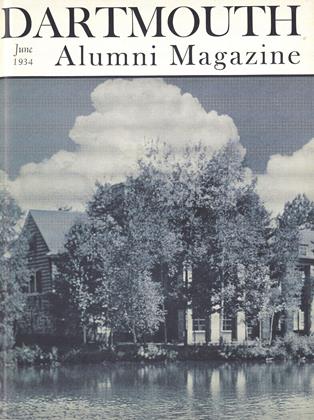Once a year come elections for class officers. They used to be held in the fall, but were changed to spring, partly because, as rumor hath it, the president-elect of the freshman class was invariably found among those flunking out of College at mid-year. This spring the seniors showed all due respect and honor for their deceased student leader, Bob Michelet, by electing him unanimously to the office of President. David T. Hedges, of Cedar Rapids, lowa, was chosen Vice-president, and will assume the usual presidential duties. Martin J. Dwyer Jr., of New Rochelle, N. Y., was named Secretary.
As has been the custom in the past, TheDaily Dartmouth ran in conjunction with the elections the annual questionnaire of senior preferences. Facetious questions were intermingled with those of a more serious turn, and the results revealed both waggish pencils and significant trends among the outgoing members of 1934. Women and Sex were the "Favorite Subjects of Conversation," while Milk eclipsed Scotch in the race for the "Favorite Drink." Football was again named the "Favorite Outdoor Sport," and Necking "Favorite Indoor Sport." Charles B. Strauss, nosed out Stanley H. Silverman, former occupant of this Chair, for the J'Class Red," and the Seniors professed a preference for capitalism, but said it must be modified to survive.
Jerry Danzig, of New York City, former Editor of The Dartmouth, took second place behind John Galsworthy for "Favorite Prose Writer," while Eleazar, anonymous columnist who mysteriously mails his poetry copy to the undergraduate daily for weekly publication, was named "Favorite Poet" over Browning. A good majority of seniors said they smoked and drank, but the surprise here was that a larger percentage admitted to the latter than to the former. Out of 231 ballots, 125 fourth-year men claimed they were not "chaste."
For the first time in many years TheNew York Herald Tribune forged ahead of The Times in senior favor. Women were found to be the "Greatest Need of the College," and Smith College the "Institution Doing Most for Dartmouth." One half of the class would not marry for money, and (believe it or not) the majority have a job lined up after graduation.
 View Full Issue
View Full Issue
More From This Issue
-
 Class Notes
Class NotesClass of 1923
June 1934 By John C. Allen, "Graham Whitelaw" -
 Article
ArticleHANOVER BROWSING
June 1934 By Rees H. Bowen -
 Class Notes
Class NotesClass of 1910
June 1934 By Harold P. Hinman -
 Sports
SportsBaseball
June 1934 By C. E. Widmayer '30 -
 Class Notes
Class NotesClass of 1908
June 1934 By L. W. Griswold -
 Class Notes
Class NotesClass of 1914
June 1934 By Edwrd Leech, Ed Leech
Article
-
 Article
ArticleWins Churchill Prize
July 1950 -
 Article
Article$150,000 Combined Fund for 1929
July 1954 -
 Article
ArticleStill Time
June 1989 -
 Article
ArticlePrediction Fiction
DECEMBER 1998 By Christine Schultz -
 Article
ArticleThe College
October 1979 By Clifford H. Smith 1879 -
 Article
ArticleRichard Hovey,-Barnstormer!
MARCH 1929 By Fordyce P. Cleaves '87

